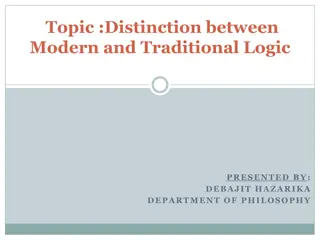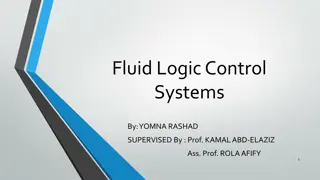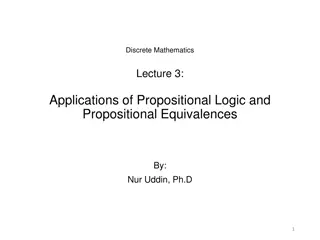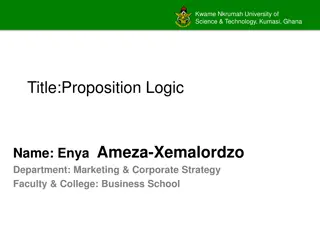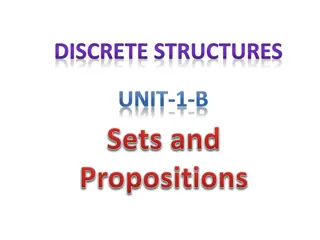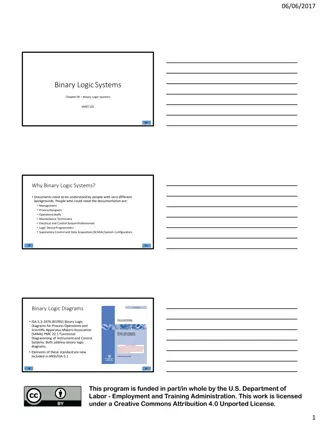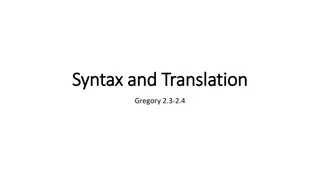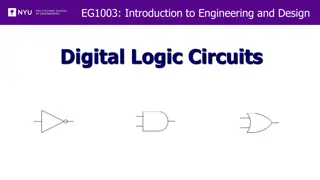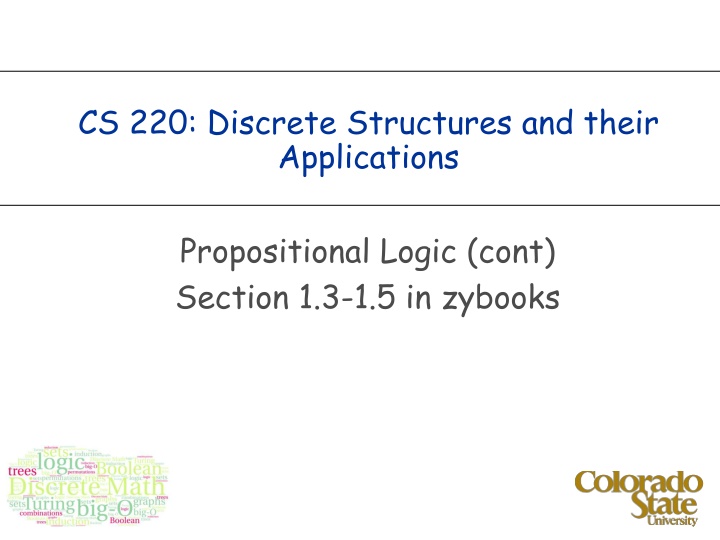
Conditional Statements and Logical Equivalences
Explore the concepts of conditional statements, including implications, converses, contrapositives, and biconditionals. Learn how to build truth tables and understand the logic behind these statements in propositional logic. Dive deep into logical equivalences and the relationships between different types of statements.
Download Presentation

Please find below an Image/Link to download the presentation.
The content on the website is provided AS IS for your information and personal use only. It may not be sold, licensed, or shared on other websites without obtaining consent from the author. If you encounter any issues during the download, it is possible that the publisher has removed the file from their server.
You are allowed to download the files provided on this website for personal or commercial use, subject to the condition that they are used lawfully. All files are the property of their respective owners.
The content on the website is provided AS IS for your information and personal use only. It may not be sold, licensed, or shared on other websites without obtaining consent from the author.
E N D
Presentation Transcript
CS 220: Discrete Structures and their Applications Propositional Logic (cont) Section 1.3-1.5 in zybooks
Conditional statements The conditional statement p q means p implies q or p is sufficient for q This is different from an if statement! p T T F F q T F T F p q T F T T The expression p implies q is true if p = false or q = true p q is the same as p q Why? Build the truth table for p q
Conditional statements To help understand conditionals think of them as an obligation or contract, e.g.: If I am elected, taxes will be lowered (taxes may become lower even if I m not elected) The only way for the contract to be broken is that I get elected and taxes won t be lowered. p T T F F q T F T F p q T F T T
Conditional statements in English p: You mow Mr. Smith's lawn. q: Mr. Smith will pay you. If p, then q. q if p. p implies q. p only if q. p is sufficient for q. q is necessary for p. If you mow Mr. Smith's lawn, then he will pay you. Mr. Smith will pay you if you mow his lawn. Mowing Mr. Smith's lawn implies he will pay you. You will mow Mr. Smith's lawn only if he pays you. Mowing Mr. Smith's lawn is sufficient for him to pay you. Mr. Smith's paying you is necessary for you to mow his lawn.
The converse, contrapositive, and inverse p T T F F q T F T F p q T F T T A few statements related to p q: The converse of p q is q p. The contrapositive of p q is q p. The inverse of p q is p q. One of the three is equivalent to the original conditional, WHICH ONE? How do you know?
The converse, contrapositive, and inverse p T T F F q T F T F p q T F T T A few statements related to p q: The converse of p q is q p. The contrapositive of p q is q p. The inverse of p q is p q. The contrapositive is equivalent to the original conditional. The converse and inverse are equivalent to each other.
Biconditionals The biconditional statement p q means p if and only if q or p iff q p T T F F q T F T F p q T F F T p q has the same truth value as p q q p
Conditionals and operator precedence Conditionals have lower precedence than conjunction and disjunction. Operator precedence: Negation Conjunction Disjunction Conditional Bi-conditional 1. 2. 3. 4. 5.
Logical equivalence Compound propositions that have the same truth values in all cases are called logically equivalent Example: p q p q p T T F F q T F T F p F F T T p q T F T T p q T F T T
Equivalence of propositions using truth tables p q p q q p p q q p T F F T p q T T F F T F T F T F T T T T F T T F F T The last two columns have the same values, so the propositions are logically equivalent
Tautology and Contradiction A tautology is a compound proposition that is always true. A contradiction is a compound proposition that is always false. A contingency is neither a tautology nor a contradiction.
Examples p p p p p p T F T F F T T F Which is a tautology and which is a contradiction?
Logical equivalence revisited Compound propositions that have the same truth values in all cases are called logically equivalent Propositions s and r are logically equivalent if and only if the proposition s r is a tautology.
De Morgans Laws ( ( ) ) De Morgan s Laws: p q p q p q p q Very useful for logical reasoning and manipulating logical statements! Example: p: The patient has migraines q: The patient has high blood pressure De Morgan's law says that the following two English statements are logically equivalent: It is not true that the patient has migraines or high blood pressure. The patient does not have migraines and does not have high blood pressure.
Equivalence of (p q) and p q Proof of logical equivalence using a truth table: p q p q p q (p q) p q T T F F T F F T F F T F T T F T T F F T T F F T T F T T
Idempotent laws: Associative laws: Commutative laws: Distributive laws: Identity laws: Domination laws: Double negation law: Complement laws: De Morgan's laws: Absorption laws: Conditional identities: p q p q p p p ( p q ) r p ( q r ) ( p q ) r p ( q r ) p q q p p ( q r ) ( p q ) ( p r ) p ( q r ) ( p q ) ( p r ) p F p p T p p F F p T T p p p p F p p T F T T F ( p q ) p q ( p q ) p q p (p q) p p (p q) p p p p p q q p p q ( p q ) ( q p )
p qr ( ) p q ( ) p r ( ) The distributive law (p q) (p r) F F p q r q r p (q r) p q p r F F F F F T F F F F F F F T F T F F F F F F F T T T T T F F T T T F T F T T F F F T T T T T T T T T T T T T T T T T T T T T
More equivalences for conditionals/biconditionals p q p q p q q p p q ( ) p q ( ) q p ( ) p q p q p q p q p q ( ) p q
Biconditional equivalence p q p q (p q) p q T T T F F T F F T T F T F T T F F T F F
Simplifying propositions using laws of propositional logic Prove that: (p q) ( p q) p Proof. (p q) ( p q) ( p q) ( p q) De Morgan s law p ( q q) distributive law p T p identity law complement law
Using equivalences to prove new facts prove: is a tautology (p q) (p q) ( p q) (p q) ( p p) ( q q) T T T by 1st De Morgan law by the commutative law by the negation law
English to Logic Consider the propositions: p Grizzly bears have been seen in the area q Hiking is safe on the trail r berries are ripe along the trail Translate from English to logic: Berries are ripe along the trail, but grizzly bears have not been seen in the area
English to Logic Consider the propositions: p Grizzly bears have been seen in the area q Hiking is safe on the trail r berries are ripe along the trail Translate from English to logic: If berries are ripe along the trail, hiking is safe if and only if grizzly bears have not been seen in the area
English to Logic Consider the propositions: p Grizzly bears have been seen in the area q Hiking is safe on the trail r berries are ripe along the trail Translate from English to logic: Hiking is not safe on the trail whenever grizzly bears have been seen in the area and berries are ripe along the trail

